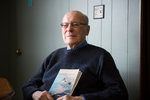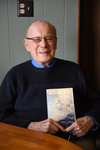

Seventy-four years ago in the Philippine Islands, paratroopers of B Company 511th floated down on white parachutes to liberate 2,142 prisoners of war, not leaving a single person behind.
Napavine resident Robert A. Wheeler, now 86, was one of those rescued that day, in the “Raid at Los Baños” in Manila, the Philippine Islands on Feb. 23, 1945 along with his brother and parents by the United States’ 11th Airborne Division. Wheeler later learned that the day they were rescued was the same day they would have been executed.
“I always think, ‘If they hadn’t come I’d be dead.’ They had our graves dug. And I wouldn’t have had two kids, nine grandkids and 12 great grandkids,” Wheeler said.
In 2018 Wheeler published a memoir, “A Child’s Life — Interrupted by the Imperial Japanese Army,” and dedicated it to the men who saved him and all the other internees at Los Baños. After 74 years, Wheeler is dedicated to making sure those involved in the raid are not forgotten.
In 1942, Wheeler’s father was arrested by Japanese soldiers while he was out on a walk. Eight months later, Wheeler, his brother and stepmother voluntarily joined his father, who had been kept at Santo Tomas University where Japanese soldiers created an internment camp. Over the next two and a half years, Wheeler and his family found ways to survive. During their time at Santo Tomas, their food and treatment was better than what they would later experience at Los Baños, Wheeler said. The camp received Red Cross care packages with canned food and milk, but Wheeler’s stepmother was frugal with the food they were given.
It wasn’t long before Wheeler and his family were taken to a different internment camp at Los Baños where their food and treatment became worse. “It’s amazing what’s edible,” Wheeler said. “I remember fried banana peels weren’t too bad. My mother didn’t like the fried slugs.”
Wheeler remembers scrounging for food with his brother in the camp’s kitchen. His brother, Albert, would pick up corn kernels on the kitchen floor until he had a full can and then their step mother would use the kernels to make cornbread.
On February 23, 1945, the Army’s 11th Airborne Division came to rescue the internees at Los Baños. The biggest thing Wheeler remembers about the rescue is waking up in the morning and walking out of the barracks for roll call at 7 o’clock. Wheeler said he could see the airplanes and the parachutes starting to fall. Then the gunfire began.
“My crazy father was sitting on the back step making some rice mush,” Wheeler said. “So I grabbed a bowl of that because I was so hungry and I dove under the bed and I was eating the rice mush while the bullets were going through the walls.”
Once the American soldiers were in the camp, Wheeler remembers the soldiers telling the internees to grab their belongings and to start moving. At one point, the soldiers began to set fire to the barracks to force the internees to hurry onto the Amtracs, Wheeler said.
“They had a heck of a time getting us to move,” Wheeler said. “The worst were the nuns and the priests because they wanted to take all their stuff. A couple of British internees stopped a paratrooper and said, ‘Would you like to stop and have a cup of tea with us?’”
From Los Baños, the liberated internees were taken to a rescue camp at New Bilibid Prison, the Philippine government penitentiary. The first thing he and Albert did at the rescue camp was get in line for food, Wheeler said. The camp served a light bean soup so as not to make the emaciated internees sick, but Wheeler and his brother didn’t care.
“We weren’t too bright. We went back for seconds and thirds. My brother and I were so sick that night,” Wheeler laughed. “We couldn’t get it into our dumb heads that we didn’t have to scrounge for food anymore.”
After a 28-day voyage by ship, Wheeler and his family arrived on the coast of California near San Pedro Harbor. Wheeler’s stepmother is alive today and is now 103 years old. When Wheeler sent her a copy of his book, she called him when she finished reading it.
“She said, ‘Bobby, where did you learn to write that well?’ That’s the first compliment I’ve gotten from her,” Wheeler said.
In 2004, the History Channel released a documentary titled “Rescue at Dawn: The Los Baños Raid.” Wheeler was invited by the production team to be a part of the documentary and was flown out to the Philippines for eight days for filming.
Over the years, Wheeler has kept in touch with other people who were involved in the Los Baños raid, including the paratroopers that saved him. He has gone to reunions and belongs to an Ex-Prisoners of War Chapter in the San Francisco Bay area for those involved with Los Banos.
“Can you imagine rescuing 2,142 men, women and children and getting them out safely, not losing one? It’s a miracle,” Wheeler said. “Now you know why I don’t want this raid to be forgotten.”
Wheeler lives in Napavine with his wife, Jean, where they spend time with their kids and grandchildren. “A Child’s Life” is currently sold at Book ‘n’ Brush, the Veteran’s Memorial Museum and Ramblin’ Jacks Rib Eye.